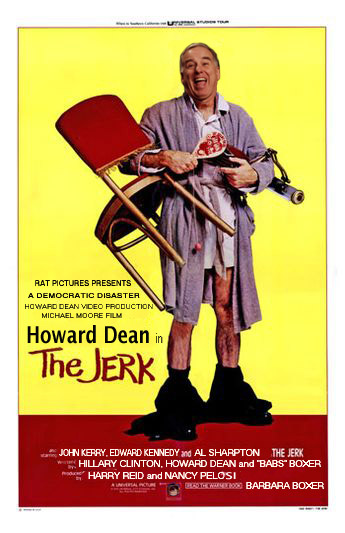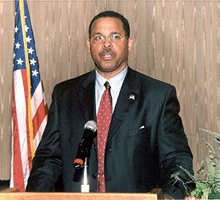Marxist / Queer Orthodoxy at the University of Colorado
Mood:
 spacey
Topic: Columns
Queer Orthodoxy at the University of Colorado
spacey
Topic: Columns
Queer Orthodoxy at the University of Colorado
By
Jon Sanders
Academic Marxism shows up clothed in the attire of many scholarly courses of study. In its most recent incarnation, academic Marxism makes an entrance as the sexy bedfellow of Lesbian, Gay, Bisexual, Transgender (LGBT) Studies at the University of Colorado at Boulder.
There, in diligent pursuit of scholarly material, co-director of LGBT studies and English professor
Mark Winokur,
explored the Internet. But such a research tool as the computer is not without its ethical problems for Professor Winokur. With the peculiarly tortured conscience of a Marxist, Winokur worries about the political acts involved in using a computer to surf the 'Net–of using such a tool for the ends of the revolution. In other words, does the revolutionary end justify the phallic means? Winokur wonders: "Can the Internet be presumed to be phallic in this fashion: simultaneously powerful and nonexistent? ... I think that the answer depends on how one views the apparatus that connects one to the Internet: the monitor." The monitor, according to Winokur, has "coercive qualities" and "is that part of the larger Internet apparatus that most immediately reminds one of now more traditional visual entertainment/information media. Governmental and corporate surveillance aside, I wonder whether, like other media, the monitor through which we view the world is always monitoring us."
After several paragraphs wrangling with these and other concerns, Winokur finds reason for optimism in a quotation from Walter Benjamin, with which he closes his essay: "Only when in technology body and image so interpenetrate that all revolutionary tension becomes bodily collective innervation, and all the bodily innervations of the collective become revolutionary discharge, has reality transcended itself to the extent demanded by the
Communist Manifesto." Goodness knows how many teenagers are in front of their monitors committing revolutionary acts of tension discharge right now.
Indeed, students signing up for classes in LGBT, which
advertises itself as "an interdisciplinary program encompassing more than 20 courses in a dozen departments [and] involv[ing] the academic investigation of sexuality in established fields such as literature, history, theatre, law, medicine, economics, sociology, anthropology and political science," will find themselves engaging in a complete indoctrination in Marxism as they prepare themselves for the intellectual challenges of ENGL 4038: Queer Modernism and ETHN 3010: Queer Ethnic Studies.
But before undertaking such heady scholarly study, they will first need to take several required classes. One is "Introduction to Lesbian, Gay, Bisexual, and Transgender Studies" (LGBT 2000), where students will find themselves "Investigat[ing] the social and historical meanings of racial, gender, and sexual identities and their relationship to contemporary lesbian, bisexual, gay, and transgender communities." That description is boilerplate academic Marxism, useful for all kinds of identity-politics programs (q.v., "Investigates the social and historical meanings of racial, gender, and sexual identities and their relationship to contemporary [insert group identity here] communities"). Students can expect to be introduced to the Marxist assumption of
social construction of identity, as evident with the phrase "social and historical meanings of racial, gender, and sexual identities." This assumption also appears to be active in the description for the program's other required class, "Introduction to Lesbian, Bisexual, and Gay Literature" (ENGL 2707), which introduces students "to some of the forms, concerns, and genres of contemporary lesbian, bisexual, and gay writing in English."
This same deterministic notion?which has animated academic Marxists since, well, Marx and Engels?can be found throughout the electives, too. Colorado's LGBT Studies course descriptions frequently promise to "interrogate," "examine," "analyze, question, and explode," etc., the current array of cultural, political, and other social elements responsible for constructing students' social beings, because, of course, those things must all change.
The student up to the challenges of interrogation and examination has a shopper's list of courses and of descriptions of the credentials of the faculty members who teach them. For example, he or she will learn that Professor Winokur's academic interests range from popular culture and film to race and ethnicity. Currently, he is working on articles titled "The Racial Fetish in American Horror," "Barbara Hammer and the Politics of Lesbian Cinema," and "Film Relics: Some Analogies Between the Classical Hollywood Style and Medieval Worship of Saints," and a book,
Technologies of Race: Makeup, Special Effects and Ethnic Groups in American Film (book). He is also co-author with Bruce Holsinger of
The Complete Idiot?s Guide to Movies, Flicks, and Film.
For the LGBT Studies program, Winokur teaches "ENGL 3856: Queer Film," which "examine[s] approximately thirteen primary texts [movies] that reflect the various ideologies, politics, and aesthetics of 'alternative sexualities' in the history of filmic representation" and "discuss[es] secondary readings that include theory, history, and criticism of both film studies and gay and lesbian studies."
The other co-director of LGBT Studies,
Jane Garrity, has interests ranging from 20th-century British literature to feminist and lesbian theory. Garrity is currently working on articles titled "'Queens Survive: Mary Butts, Homophile" and "Queer Modernism." She has contributed articles to
Straight With a Twist: Queer Theory and the Subject of Heterosexuality, edited by Calvin Thomas, and
Lesbian Erotics, edited by Karla Jay. She wrote
Step-Daughters of England: British Women Modernists and the National Imaginary,
a book that reads British woman modernists? "literary texts through the lens of material culture" and "demonstrates the intersections among nationalism, imperialism, gender and sexuality in the construction of English national culture." Her book
Sapphic Modernities: Sexuality, Women, and Modern English Culture, co-edited with Laura Doan, is forthcoming. The book description on
Amazon.com states, "This exciting collection?s aim is to show how the sapphic [i.e., lesbian] figure, in her multiple and contradictory guises, refigures the relation between public and private space, interrogates the category of Englishness, and redefines what it means to be a modern citizen in the early decades of the twentieth century."
Garrity?s contribution to the LBGT Studies program is "ENGL 4038: Queer Modernism," which "look[s] closely at the relation between each author?s textual innovations and his/her representation of sexual difference, asking the crucial question: is sexuality conceived as something that is natural, or is it understood to be a cultural construct?" and also "examine[s] the various ways that the meaning of the body and desire shift and change in modernist texts, paying close attention to how these representations intersect with the categories of gender, race, class and national identity." She also teaches "ENGL 4287 (1): Twentieth-century Anglo-American Lesbian Literature and Theory," which "tracks the lesbian in British and American literature" and "begin[s] by interrogating the category of 'the lesbian text,'" then "examine[s], among other things, the relationship between historical context and representational possibilities, the constraining or enabling impact of 'community,' the class and racial inflections of 'lesbian' identity, and also the benefits and dangers?for a marginalized group?of being put into and reclaiming representational space."
The program?s
course listing also offers "ENGL 3217-1: Film/Theory/Gender" taught by Prof.
Ann M. Kibbey, whose professional interests are "Gender studies; feminist theory; film studies." Kibbey is the author of
Theory of the Image: Capitalism, Contemporary Film, and Women, in which she "contends that the image itself is an ideological construct," "argues that capitalism enforces social identity and fetishism through religious iconoclastic beliefs about the commodity as image," "creates a new feminist approach to women in film" and "challenges conservative and racist agendas informing the assumption that a photograph records an image."
Kibbey is also the founding editor of the journal
Genders, which contains such articles as "Utopia and Castration: How to Read the History of Homosexuality," "Rhetoric on the Medical Management of Intersexed Children: New Insights into 'Disease', 'Curing', 'Illness', and 'Healing,'" "Flesh in the Word:
Billy Budd, Sailor, Compulsory Homosociality, and the Uses of Queer Desire," and "How My Dick Spent Its Summer Vacation: Labor, Leisure, And Masculinity On The Web."
Her course "Film/Theory/Gender" "is about modern leftist films," "analyz[es] the construction of genders as socialized roles, as reactionary and coercive methods of social organization" with the "primary interest" being "the deployment of gender in relation to political and economic concepts." This entails "analyzing the film image as an ideological construct" and "critiqu[ing] the concept of gender-as-explanation through readings in leftist theory by Eisenstein, Bourdieu, Debord, Foucault, Lukacs, etc."
Then there?s "ENGL 4277-1: Early Modern Women Writers (1500-1700)," taught by Prof.
Valerie Forman, whose interests range from early modern literature, drama, poetry and culture to Marxist and critical theory. Forman?s essay on "Material Dispossessions and Counterfeit Investments: The Economies of
Twelfth Night" was published in
Money and the Age of Shakespeare: Essays in New Economic Criticism (2003), edited by Linda Woodbridge. Forman has an essay forthcoming in
The Journal of Medieval and Early Modern Studies that would provide "A Marxist Reading of the Early Documents of the English East India Company."
Her "Early Modern Women Writers" course promises to consider such issues as, "How did women writers of 'fictional' texts engage in the writing and rewriting of history? How did women participate in the production of new knowledges?scientific, legal, political, and economic?and in revolutionary political activities? What were women?s contributions to the discursive constructions and deconstructions of nation and empire, of gender, sexuality, and desire, of social status and race?"
"ENGL 5179 (1): African American Literature and Queer Theory" is taught by Prof.
Vincent Woodard, who is a poet interested in "literatures" categorized as ethnic, Third World, African-American, queer, and 19th- and 20th-century American, and who is also interested in "African diasporic studies." Woodard has published essays titled "Just as (Queer) as They Want To Be: A Review of the Black Queer Studies in the Millennium Conference" and "Haiti, Myth-making and Black Gay Identity Politics in the Writing of Assotto Saint." He delivered a 2003 "
Diaspora Talk" at the University of Texas Center for African & African American Studies on the subject of "Anal-Rights, Civilized-Bodies, and the Politics of Sanctification."
Woodard?s "African American Literature and Queer Theory" primarily seeks "to understand how black queer (gays, lesbians, transgendered, transexual, bisexual and even heterosexual) artists, activists and critics have constructed queer theoretical paradigms that have originated in the intimate regions of their lives, and then translated these personal theoretical models into the more public, externalized domains of black experience" and how "this process of intersecting the personal with the public and political is a strategy inherent in African American, feminist, gay and lesbian and queer theoretical communities."
Also there is "ETHN 3010: Queer Ethnic Studies," taught by Prof.
Emma Perez, who has replaced Ward Churchill as the chairman of Colorado?s Ethnic Studies program. Perez is known to
FrontPage Magazine readers as one of Churchill?s "earliest?and most fanatical ?defenders," having written for
Counterpunch.org that the "attacks on Ward Churchill" are "A Neocon Test Case For Academic Purges." Recently Perez lectured at Colorado College on the subject of "Racialized Sexualities in the Borderlands." She has also given a "Queer Speakers Series"
lecture at UC-Santa Barbara on the topic of "The Technologies of Desire," which "examine[d] how desire works as a theory and method for social change" and a
lecture at UC-Los Angeles in 2003 on "Queering the Border: An El Paso/Juarez Case Study." Perez is a founding member of Mujeres Activas en Letras y Cambio Social (MALCS) ("Women Active in Letters and Social Change"), a group devoted to "Chicana/Latina feminist perspectives," and is author of
The Decolonial Imaginary: Writing Chicanas into History (Theories of Representation and Difference) and the novel
Gulf Dreams. In her novel "Perez traces the life of one woman, a girl who falls in love with another girl. The narrator refuses the path laid out for female friendships ?comadres [sic] who will see one another through 'adolescence, marriage, menopause, death, and even divorce,'?saying instead 'I had not come for that. I had come for her kiss.' Ironically, the unnamed (lesbian) narrator learns sex from her (heterosexual? bisexual? otherwise queer?) girlfriend, as the latter recounts what her boyfriend does for her."
Perez? "Queer Ethnic Studies" promises to "explore the social construction of racialized queer sexuality" and that "the manner in which race and sexuality collide to construct non-heteronormative bodies and cultures will be investigated." The course will also look at "how deviant behavior in the 19th century has become a politicized queer identity in the 21st century," "challenge the manner in which 'deviance' becomes privileged rather than erotica when examining queer sexualities," and "interrogate" the problem that "the majority of historical and theoretical studies on queer sexuality ignore race." Finally, it promises to "examine representations of sexual 'deviants' and track ideologies about queer sexualities as well as interrogate theories."
"GRMN/FILM 3504: Women and German Film" is taught by Prof.
Patrick Greaney, whose interests are French, German, Australian, Italian and Japanese literature, literary theory, and New German cinema. Greaney "has published articles on Holderlin, Nietzsche, Fassbinder, and theories of poverty and globalization." He also has "recently completed a book manuscript, titled
Impoverished Writing, which explores the theoretical foundations of modern French and German literary and philosophical texts about poverty and power."
"Women and German Film" seeks to answer the questions "Why does violence play such an important role in the work of feminist, queer, and transgender directors? What is liberating for these directors about the destruction of bodies and identities?" It also "offer[s] an introduction to the field of feminism and film studies with special attention to German cinema after 1970 ... films about women and transgender figures and films made by women and transgendered directors."
Visiting scholar
Christopher Laferl from the University of Vienna teaches "GRMN 4503-3: Divas: Cultures and Theories of Stardom." This course "address[es] the figure of the diva in a global perspective as an artistic, cultural, and historical construction that engages key issues in cultural and media theory," asking such questions as "How did these stars of the past shape themselves into divas on stage as well as in their lives? How do their followers in the early 21st century (such as Nina Hagen, Madonna and Jennifer Lopez) continue this tradition?" The course promises to "address key issues in cultural studies, feminism, and media theory that come into play when discussing divas."
Prof.
Kira Hall, whose interests are language, gender, and sexuality, teaches "LING 2400. Language and Gender." Hall is co-editor with Mary Bucholtz of
Gender Articulated: Language and the Socially Constructed Self, which "forges new connections between language-related fields and feminist theory" and whose essays "Refut[e] apolitical, essentialist perspectives on language and gender" and "explicitly connect feminist theory to language research." With Anna Livia, Hall co-edited
Queerly Phrased: Language, Gender, and Sexuality, a "compilation of research on the peculiar use of language in gay and lesbian communities [that] breaks new ground," "documents lexical usage and variation in deaf, Jewish, Japanese, and other communities," looks at "computer-mediated text (E-mail), homophobic slang, media reports, and literary language to conclude whether characteristics specific to gay and lesbian speech must be found exclusively in speech to label them as 'gay,'" and "examines the fluid nature of gender and sexuality and how that may be seen in the conscious use of language as it applies to hermaphrodites, the castrated hijras of India, Nigerian transvestites, Yoruba priests, Parisian gays, and Japanese same-sex couples." The hijras, "a transgendered group often discussed in the anthropological literature as a 'third sex,'" is the subject of a forthcoming book.
"Language and Gender" pledges to "examine organizations of language, gender, and sexuality from a crosscultural perspective" involving "the investigation of how cultural paradigms of gender relations are perpetuated through language; the study of innovative uses of language to challenge or subvert these dominant paradigms; and the examination of how women and men use language to construct social identities and communities." The course addresses the following themes: "differences between 'men's talk' and 'women's talk'; linguistic constructions of masculinity and femininity; ritual insult, slang, and gossip; sexism in language; how children learn gender through language; language and sexual harassment; the interaction of gender with race, ethnicity, and class; gender in cyberspace; gay, lesbian, and transgender uses of language; and gender and bilingualism."
Sheila M. Rucki teaches "PSCI 4291 (3). Sex Discrimination: Federal and State Law," which "Examines continuity and change in legal treatment of sex and gender. Using the case method, focuses on family law, education equity, employment law, and gender-related criminal law."
There is also Glenda Walden's "SOCY 1006, WMST 1006: Social Construction of Sexuality." This course uses "a queer feminist perspective of the social constructionist paradigm to critically engage with essentialist and biological determinist perspectives, dominant in Western society, regarding sexual identity and sexual expression." This means that "Contemporary sexual identity, desire, behavior, health, research, and expert advice will be viewed in part as outcomes and techniques of social control." Furthermore, the course seeks to "explore the construction of heterosexuality, femininity, and masculinity as they impact our cultural and individual understandings of sexuality," "examin[e] and analyz[e] our own and others' sexualities in a sociological perspective of larger trends and social influences," and to identify "erotic injustice and oppression."
A
Fall 2001 syllabus shows the course required
Sexuality Today: The Human Perspective by Gary Kelly,
The Good Vibrations Guide to Sex by Cathy Winks and Anne Semans, and
The Good Vibrations Guide to Adult Videos by Cathy Winks. Walden wrote that she used the "social constructionist perspective [which] is founded on the principle that the language we use creates our reality and experience of the world in which we live," meaning "we will consciously use language to uncover the implicit meanings about sexuality and gender and how words are used to create our common understanding of sexuality." Class presentations included discussions of "sex pioneers," "gendered" and other "scripts" of sexuality, "sexually explicit images in video format or photographs," and a "Guest Presentation on BDSM philosophy and practices," which features "a discussion of BDSM practices and philosophy as well as a safety demonstration of some techniques" and to which "Your guests are welcome" but alas, "No cameras or recording devices are permitted."
"SOCY 1016, WMST 1016: Sex, Gender, and Society" is taught by Prof.
Eleanor Hubbard, whose interests are "interpretative sociology, qualitative research methods, sex and gender, diversity." Hubbard has published essays on the topics of "Whites" and "Everyday Ideology: A Case Study of Sexual Activity." She is completing work on "Coming Out: Heterosexual Students' Emotional Experience with a Coming Out Assignment," although it?s unlikely her heterosexual students knew they were being exploited while they were being emotionally disrupted by an assignment that countered their sexual "ideology."
Bud Coleman teaches "THTR 6081: Seminar in American Theatre: Lesbians and Gays." Coleman?s recent work includes a 2004
paper on "The (Re-)Performed Gay Male Body: A Queer Biography?" a chapter titled "The Electric Fairy?The Apparition and The Woman? Loie Fuller" in Volume II of
Passing Performances: Queer Readings of Leading Players in American Theatre History, edited by Kim Marra and Robert A. Shanke; and conference presentations on the subjects of American vaudeville and "Performance Transvestism." Coleman is also the author, director, and performer of one-man show
An Evening?s Intercourse With Natasha Notgoudenuff, Bailiwick Theatre, Chicago.
"Seminar in American Theatre: Lesbians and Gays" looks at "the portrayal of lesbians and gays in mainstream American theatre during the 20th century, as well as the contributions of gay and lesbian theatre artists during the same period."
Currently, the LGBT Studies program offers one graduate-level course: "JOUR 6871: Special Topics: Gays in the Media," taught by Prof.
Meg Moritz. Moritz was a writer and story consultant for the film
Scout?s Honor, which "traces the conflict between the anti-gay policies of the Boy Scouts of America and the broad-based movement by many of its members to overturn them." She has written a documentary on the Columbine school shooting,
Covering Columbine, and published an essay about news coverage of the September 11 terrorist attacks in
Representing Realities: Essays on American Literature, Art and Culture. Moritz "is on the Board of Governors of the National TV Academy, Heartland Chapter, a member of the Research Advisory Board for the GLAAD and a founding board member of the Boulder Gay and Lesbian Film Festival."
"Gays in the Media" notes that "In an era of media saturation and sexual appropriation, mainstream images of sexuality and gender offer complex and shifting definitions of normalcy" and "explore[s] representations of gays in the media over the last several decades as interpreted by a range of theorists, including Butler, Duberman, Doty, Gross, Sedgewick, Fiske, Rubin and Hall."
A few courses in the syllabus are listed without an instructor specified, but like the others, their descriptions generally hew to the Marxist notion of social "construction" of one?s gender and sexuality. For example, "ENGL 3796: Queer Theory ... Surveys theoretical, critical, and historical writings in the context of lesbian, bisexual, and gay literature" and "Examines relationships among aesthetic, cultural, and political agendas, and literary and visual texts of the 20th century."
Meanwhile, "WMST 2600: Gender, Race, and Class in Contemporary U.S. Society" involves itself in "the main forms of domination in U.S. society around gender, class, and race relations" and "Examines intersections of the relations and influences in institutions and everyday life" with "[p]articular attention given to "women of color perspectives and resistance to domination."
Finally, "WRTG 3020: Topics in Writing: Queer Rhetorics" starts "with an[other] introduction to Queer Theory" and proceeds "first to examine notions of 'queer' and later to analyze, question, and explode the discourse of queer, the binary of straight/queer, and politics of power embedded in any college course, even Queer Rhetorics." The goal is "a course that is safe and encouraging for those who identify as queer, as well as those who do not, a course that questions itself, and a course that is shaped around the politics of queer. The assignments, the texts, the goals, and the space of the classroom will be 'queered,' or not quite 'straight.'"
FrontPageMagazine ~ Jon Sanders ** Queer Orthodoxy at the University of Colorado
Posted by uhyw
at 7:42 AM EDT
Updated: Thursday, June 9, 2005 7:57 AM EDT
 Deficit Is Arriving Under Forecasts
Good News for White House Comes on Economy's Climb, High Level of Tax Receipts
Excerpted from: Wall Street Journal (.com)
The White House, which hasn't had much good news since President Bush's second term began, is about to start spreading some: This year's deficit is coming in lower than anticipated, thanks to the economic recovery and higher-than-expected tax receipts.
While the administration and Congress won't officially revise their separate annual deficit projections until midsummer for fiscal 2005, which ends Sept. 30, government and private-sector analysts agree the shortfall is more likely to be about $350 billion, rather than the $427 billion the administration forecast in January. Treasury Secretary John Snow is expected to carry the tidings to London for this weekend's summit of finance ministers from the Group of Eight leading nations, who have harped on the growing American debt and foreign borrowing.
Deficit Is Arriving Under Forecasts
Good News for White House Comes on Economy's Climb, High Level of Tax Receipts
Excerpted from: Wall Street Journal (.com)
The White House, which hasn't had much good news since President Bush's second term began, is about to start spreading some: This year's deficit is coming in lower than anticipated, thanks to the economic recovery and higher-than-expected tax receipts.
While the administration and Congress won't officially revise their separate annual deficit projections until midsummer for fiscal 2005, which ends Sept. 30, government and private-sector analysts agree the shortfall is more likely to be about $350 billion, rather than the $427 billion the administration forecast in January. Treasury Secretary John Snow is expected to carry the tidings to London for this weekend's summit of finance ministers from the Group of Eight leading nations, who have harped on the growing American debt and foreign borrowing.
 Administration officials say the improved fiscal picture suggests the president is on track to deliver more quickly on a campaign promise to cut the annual deficit in half as a share of the total U.S. economy, to 2.3% of gross domestic product. (By comparison, last year's $412 billion deficit was 3.6% of GDP.)
(Origional story requires registration)
Administration officials say the improved fiscal picture suggests the president is on track to deliver more quickly on a campaign promise to cut the annual deficit in half as a share of the total U.S. economy, to 2.3% of gross domestic product. (By comparison, last year's $412 billion deficit was 3.6% of GDP.)
(Origional story requires registration)

 Former Massachusetts House Speaker Thomas Finneran speaks at the Statehouse in Boston in this Dec. 7, 2004, file photo. Finneran was charged Monday, June 6, 2005, with lying to a federal appeals court about his involvement in a legislative redistricting plan that minority groups said would hurt black and Hispanic candidates. The federal indictment charges Finneran with three counts of perjury and one count of obstruction of justice. >>>>>
BOSTON - When former House Speaker Thomas Finneran appears in federal court next week to answer charges of perjury and obstruction of justice, it will mark another chapter in a storied political career.
On Monday Finneran was charged with lying to a federal appeals court about his involvement in a legislative redistricting plan that minority groups said would hurt black and Hispanic candidates.
"My response to the charges brought against me today is NOT GUILTY. My family and I look forward to my day in court," he said in a statement Monday.
Finneran, who resigned last September to head the Massachusetts Biotechnology Council, was widely considered the state's most powerful lawmaker during his eight years as speaker.
The Boston Democrat was dubbed "King Tom" for pushing through a rules change that removed term limits for House speakers. Finneran led the 160-member House from 1996 to 2004. He blocked bills, pushed through others, and helped decide how to spend billions of tax dollars.
The federal indictment charges Finneran with three counts of perjury and one count of obstruction of justice.
"It is a severe breach of the public trust and serves to diminish confidence in government and undermine the integrity of our judicial process," U.S. Attorney Michael Sullivan said. "What's important is when someone raises his hand to tell the truth, he tells the truth."
Each perjury count carries a maximum sentence of five years in prison and a $250,000 fine, while the obstruction charge carries a maximum sentence of 10 years and a $250,000 fine. Finneran also could lose his license to practice law.
He is to appear in court on June 14.
The indictment ends months of speculation about whether Finneran would face criminal charges tied to his 2003 testimony before the 1st U.S. Circuit Court of Appeals in a lawsuit brought by a coalition of minority groups.
The groups claimed that a new map of legislative districts would hurt minority candidates and protect incumbents, including Finneran, who represented Boston's Mattapan section.
He told the three-judge panel he had no role in drafting the map beyond appointing members of a redistricting committee. In its ruling, the 1st Circuit said it found his testimony hard to believe.
"Although Speaker Finneran denied any involvement in the redistricting process, the circumstantial evidence strongly suggests the opposite," the judges wrote. The court threw out the map last year and ordered a new one drawn, saying lawmakers sacrificed "racial fairness" to protect incumbents.
Finneran's attorney, Richard Egbert, has said Finneran never denied being involved in the redistricting process. Egbert did not immediately return calls for comment on Monday.
The Massachusetts Biotechnology Council said it is standing by its president.
"We continue to have confidence in Tom Finneran's ability to lead the MBC and have every expectation that he will continue to do so," board chairwoman Una Ryan said in a statement.
Former Massachusetts House Speaker Thomas Finneran speaks at the Statehouse in Boston in this Dec. 7, 2004, file photo. Finneran was charged Monday, June 6, 2005, with lying to a federal appeals court about his involvement in a legislative redistricting plan that minority groups said would hurt black and Hispanic candidates. The federal indictment charges Finneran with three counts of perjury and one count of obstruction of justice. >>>>>
BOSTON - When former House Speaker Thomas Finneran appears in federal court next week to answer charges of perjury and obstruction of justice, it will mark another chapter in a storied political career.
On Monday Finneran was charged with lying to a federal appeals court about his involvement in a legislative redistricting plan that minority groups said would hurt black and Hispanic candidates.
"My response to the charges brought against me today is NOT GUILTY. My family and I look forward to my day in court," he said in a statement Monday.
Finneran, who resigned last September to head the Massachusetts Biotechnology Council, was widely considered the state's most powerful lawmaker during his eight years as speaker.
The Boston Democrat was dubbed "King Tom" for pushing through a rules change that removed term limits for House speakers. Finneran led the 160-member House from 1996 to 2004. He blocked bills, pushed through others, and helped decide how to spend billions of tax dollars.
The federal indictment charges Finneran with three counts of perjury and one count of obstruction of justice.
"It is a severe breach of the public trust and serves to diminish confidence in government and undermine the integrity of our judicial process," U.S. Attorney Michael Sullivan said. "What's important is when someone raises his hand to tell the truth, he tells the truth."
Each perjury count carries a maximum sentence of five years in prison and a $250,000 fine, while the obstruction charge carries a maximum sentence of 10 years and a $250,000 fine. Finneran also could lose his license to practice law.
He is to appear in court on June 14.
The indictment ends months of speculation about whether Finneran would face criminal charges tied to his 2003 testimony before the 1st U.S. Circuit Court of Appeals in a lawsuit brought by a coalition of minority groups.
The groups claimed that a new map of legislative districts would hurt minority candidates and protect incumbents, including Finneran, who represented Boston's Mattapan section.
He told the three-judge panel he had no role in drafting the map beyond appointing members of a redistricting committee. In its ruling, the 1st Circuit said it found his testimony hard to believe.
"Although Speaker Finneran denied any involvement in the redistricting process, the circumstantial evidence strongly suggests the opposite," the judges wrote. The court threw out the map last year and ordered a new one drawn, saying lawmakers sacrificed "racial fairness" to protect incumbents.
Finneran's attorney, Richard Egbert, has said Finneran never denied being involved in the redistricting process. Egbert did not immediately return calls for comment on Monday.
The Massachusetts Biotechnology Council said it is standing by its president.
"We continue to have confidence in Tom Finneran's ability to lead the MBC and have every expectation that he will continue to do so," board chairwoman Una Ryan said in a statement.

 The mouth that won't stop roaring
The mouth that won't stop roaring <<<<< Doug Forrester spent millions of his own fortune to finance a primary campaign that took aim at New Jersey's nation-high property taxes.
\/
TRENTON, N.J. - A millionaire businessman won New Jersey's Republican gubernatorial primary Tuesday and earned the right to face Democratic Sen. Jon Corzine in November — the state's first race for governor since James McGreevey resigned in a gay-sex scandal.
Doug Forrester edged former Jersey City Mayor Bret Schundler after spending millions of his own fortune to finance a campaign that took aim at the state's highest-in-the-nation property taxes.
Corzine easily won the Democratic primary after facing only token opposition.
With 99% of precincts counted, Forrester had 106,542 votes, or 36%, to 93,541 votes, or 31%, for Schundler in the seven-way primary. Corzine had 88% of the vote.
In other races around the country, a 70-year-old retired judge defeated a 30-year-old Hispanic city councilman in a runoff for mayor of San Antonio, the nation's eighth-largest city.
Forrester promised to "turn Jersey around" in a fiery victory speech in which he attacked the senator as being ill-equipped to solve New Jersey's property tax dilemma.
"He (Corzine) can't fix these problems because he is part of the problem," Forrester said to cheering supporters. "Our victory tonight is a message to Jon Corzine: Don't come home, we can't afford you."
Hours earlier, Corzine accepted his party's nomination without attacking the Republicans or Forrester. "Tonight I make a pledge to the people of New Jersey, I won't be anybody's governor but yours," he said in a veiled reference to New Jersey's image as a state rife with political corruption.
Corzine declared his candidacy in December, a month after McGreevey, a fellow Democrat, resigned following his announcement that he had an extramarital affair with a man while in office. The man was later identified as his homeland security adviser.
<<<<< Doug Forrester spent millions of his own fortune to finance a primary campaign that took aim at New Jersey's nation-high property taxes.
\/
TRENTON, N.J. - A millionaire businessman won New Jersey's Republican gubernatorial primary Tuesday and earned the right to face Democratic Sen. Jon Corzine in November — the state's first race for governor since James McGreevey resigned in a gay-sex scandal.
Doug Forrester edged former Jersey City Mayor Bret Schundler after spending millions of his own fortune to finance a campaign that took aim at the state's highest-in-the-nation property taxes.
Corzine easily won the Democratic primary after facing only token opposition.
With 99% of precincts counted, Forrester had 106,542 votes, or 36%, to 93,541 votes, or 31%, for Schundler in the seven-way primary. Corzine had 88% of the vote.
In other races around the country, a 70-year-old retired judge defeated a 30-year-old Hispanic city councilman in a runoff for mayor of San Antonio, the nation's eighth-largest city.
Forrester promised to "turn Jersey around" in a fiery victory speech in which he attacked the senator as being ill-equipped to solve New Jersey's property tax dilemma.
"He (Corzine) can't fix these problems because he is part of the problem," Forrester said to cheering supporters. "Our victory tonight is a message to Jon Corzine: Don't come home, we can't afford you."
Hours earlier, Corzine accepted his party's nomination without attacking the Republicans or Forrester. "Tonight I make a pledge to the people of New Jersey, I won't be anybody's governor but yours," he said in a veiled reference to New Jersey's image as a state rife with political corruption.
Corzine declared his candidacy in December, a month after McGreevey, a fellow Democrat, resigned following his announcement that he had an extramarital affair with a man while in office. The man was later identified as his homeland security adviser.
 Corzine's name recognition and wealth — he spent a record $63 million of his own fortune to get elected to the Senate in 2000 — will make the former Goldman Sachs chairman the favorite against Forrester in this Democratic-leaning state. Like his GOP rivals, Corzine has promised property tax relief. His plan would shift the property tax burden away from senior citizens and poor working families.
Forrester has said he will reduce property taxes by 10% in each of the next three years through spending cuts and layoffs.
The New Jersey contest is one of only two governor's races being decided this year. The other is in Virginia.
Forrester, 52, is the owner of a prescription drug management company and former mayor of West Windsor, outside Princeton. He spent $7 million of his own money in 2002 trying to win a Senate seat, but Frank Lautenberg came out of retirement and beat him by 10 points.
Forrester had a big spending edge over Schundler, who accepted public matching funds. According to one estimate, Forrester spent more than $5 million on TV advertising alone.
In his victory speech, Forrester made special mention of his daughter Briana, 18, who suffered a near fatal brain hemorrhage in February 2004 and was diagnosed with cancer seven months later.
Forrester nearly skipped the governor's race. But his daughter, the youngest of his three children, insisted he run.
The winner in November will succeed Democrat Richard J. Codey, who as president of the state Senate became acting governor when McGreevey stepped down. Codey decided not to run for a full term.
In other races Tuesday:
♠ Former judge Phil Hardberger, 70, beat Julian Castro, a youthful city councilman, in the race to become mayor of San Antonio after a campaign that got closer — nastier — in recent weeks. Hardberger picked up 51.5% to Castro's 48.5%, pulling off an improbable comeback after losing by double-digits in last month's election. The race was forced into a runoff because neither candidate recieved more than 50% of the vote. Castro would have become the second Hispanic elected mayor of a big city in three weeks, following Antonio Villaraigosa's victory in Los Angeles last month.
♠ In Atlantic City, a veteran lifeguard ousted the incumbent in the race to lead the New Jersey gambling town. The victory by Bob Levy followed a mean-spirited campaign.
Corzine's name recognition and wealth — he spent a record $63 million of his own fortune to get elected to the Senate in 2000 — will make the former Goldman Sachs chairman the favorite against Forrester in this Democratic-leaning state. Like his GOP rivals, Corzine has promised property tax relief. His plan would shift the property tax burden away from senior citizens and poor working families.
Forrester has said he will reduce property taxes by 10% in each of the next three years through spending cuts and layoffs.
The New Jersey contest is one of only two governor's races being decided this year. The other is in Virginia.
Forrester, 52, is the owner of a prescription drug management company and former mayor of West Windsor, outside Princeton. He spent $7 million of his own money in 2002 trying to win a Senate seat, but Frank Lautenberg came out of retirement and beat him by 10 points.
Forrester had a big spending edge over Schundler, who accepted public matching funds. According to one estimate, Forrester spent more than $5 million on TV advertising alone.
In his victory speech, Forrester made special mention of his daughter Briana, 18, who suffered a near fatal brain hemorrhage in February 2004 and was diagnosed with cancer seven months later.
Forrester nearly skipped the governor's race. But his daughter, the youngest of his three children, insisted he run.
The winner in November will succeed Democrat Richard J. Codey, who as president of the state Senate became acting governor when McGreevey stepped down. Codey decided not to run for a full term.
In other races Tuesday:
♠ Former judge Phil Hardberger, 70, beat Julian Castro, a youthful city councilman, in the race to become mayor of San Antonio after a campaign that got closer — nastier — in recent weeks. Hardberger picked up 51.5% to Castro's 48.5%, pulling off an improbable comeback after losing by double-digits in last month's election. The race was forced into a runoff because neither candidate recieved more than 50% of the vote. Castro would have become the second Hispanic elected mayor of a big city in three weeks, following Antonio Villaraigosa's victory in Los Angeles last month.
♠ In Atlantic City, a veteran lifeguard ousted the incumbent in the race to lead the New Jersey gambling town. The victory by Bob Levy followed a mean-spirited campaign.
 Ohio Secretary of State, Ken Blackwell is a Democrats nightmare. He is part of the team that delivered that tight, crucial state to ‘W’ in November and is now running to be Ohio’s next governor. Black, educated, articulate and likable he could springboard from the governor's mansion to VP or President in 2008. The terror is that he could be exactly the kind of person who helps draw large numbers of black voters to the Republican Party, spelling the end of any national hopes for the party and throwing local and statewide positions in reliably blue states up for grabs.
Ohio Secretary of State, Ken Blackwell is a Democrats nightmare. He is part of the team that delivered that tight, crucial state to ‘W’ in November and is now running to be Ohio’s next governor. Black, educated, articulate and likable he could springboard from the governor's mansion to VP or President in 2008. The terror is that he could be exactly the kind of person who helps draw large numbers of black voters to the Republican Party, spelling the end of any national hopes for the party and throwing local and statewide positions in reliably blue states up for grabs.
 Soros Group: Blackwell Is No. 1 Target for Democrats
Liberal forces – including a key group backed by George Soros - are saying their No. 1 political target is Ohio's secretary of state, Ken Blackwell.
An array of liberal groups is gearing up to derail Blackwell's candidacy for governor of Ohio in next year's election.
The Democrats fear that Blackwell, a staunch conservative, will play a key role in winning Ohio for the Republican presidential ticket in 2008 – just as he did in 2004.
They also worry that the conservative one-time football player could be a powerful addition to the GOP presidential ticket in 2008.
The left-wing Air America Radio, which carries hosts like Al Franken, blasted Blackwell in early June and urged listeners to support an organized effort to defeat him.
And Steve Rosenthal, CEO of the 527 group America Coming Together – a group backed by anti-Bush billionaire George Soros – has called the 2006 Ohio governor's race the most important in the nation.
Here's why:
"The hot 2008 GOP presidential ticket links either Virginia Sen. George Allen or Mississippi Gov. Haley Barbour with Ohio Secretary of State Ken Blackwell, a 2006 gubernatorial candidate," reports the Web site of U.S. News & World Report.
"He's the guy Republicans love for certifying Ohio's 2004 vote for President Bush. And he's African-American and conservative. 'With him as No. 2, it creates a dream ticket,' said a GOP strategist."
Blackwell's candidacy also appears to be a nightmare for the Ohio Democratic Party, which has a banner across the top of its Web site reading: "Help Ohio Democrats Stop Ken Blackwell."
Blackwell supporters have fired back with a posting saying Democrats "are raising money nationwide to defeat this conservative African-American statesman" and asking for donations to help Blackwell fend off his opponents' efforts.
Soros Group: Blackwell Is No. 1 Target for Democrats
Liberal forces – including a key group backed by George Soros - are saying their No. 1 political target is Ohio's secretary of state, Ken Blackwell.
An array of liberal groups is gearing up to derail Blackwell's candidacy for governor of Ohio in next year's election.
The Democrats fear that Blackwell, a staunch conservative, will play a key role in winning Ohio for the Republican presidential ticket in 2008 – just as he did in 2004.
They also worry that the conservative one-time football player could be a powerful addition to the GOP presidential ticket in 2008.
The left-wing Air America Radio, which carries hosts like Al Franken, blasted Blackwell in early June and urged listeners to support an organized effort to defeat him.
And Steve Rosenthal, CEO of the 527 group America Coming Together – a group backed by anti-Bush billionaire George Soros – has called the 2006 Ohio governor's race the most important in the nation.
Here's why:
"The hot 2008 GOP presidential ticket links either Virginia Sen. George Allen or Mississippi Gov. Haley Barbour with Ohio Secretary of State Ken Blackwell, a 2006 gubernatorial candidate," reports the Web site of U.S. News & World Report.
"He's the guy Republicans love for certifying Ohio's 2004 vote for President Bush. And he's African-American and conservative. 'With him as No. 2, it creates a dream ticket,' said a GOP strategist."
Blackwell's candidacy also appears to be a nightmare for the Ohio Democratic Party, which has a banner across the top of its Web site reading: "Help Ohio Democrats Stop Ken Blackwell."
Blackwell supporters have fired back with a posting saying Democrats "are raising money nationwide to defeat this conservative African-American statesman" and asking for donations to help Blackwell fend off his opponents' efforts.